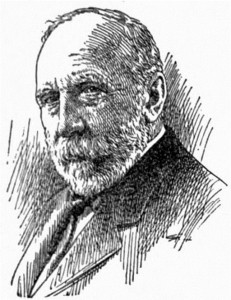
Country of origin: Germany
Year came to U.S.: 1852
Education: Seventh Grade equivalent
Business: Weyerhaeuser Company (1900)
Headquarters: Seattle, WA
2023 revenue: $7.6 billion
Worldwide employment: 9,318
Ranked 476 in the 2024 Fortune 500

The New York Times credited Weyerhäuser’s incredible success to “German regularity, caution, thrift, industry and perseverance.”
Weyerhaeuser Company is one of the world’s largest pulp and paper companies.
Biography
“I think I have succeeded because I care more for my credit than for my clothes,” said Frederick Weyerhäuser, according to The New York Times. In one sentence, Weyerhauser summed up the rags-to-riches story that saw him go from a fatherless farm boy in Germany to the eighth richest American of all time (as a percentage of the U.S. economy).
Born in a farming area of Germany in 1834, Weyerhäuser’s father died when he was 10, and he quit school at age 12. At age 18, he moved to the United States and settled in Rock Island, Illinois, where he took up a lowly position at a saw mill. He quickly established a reputation for untiring industry and staunch honesty, which were rewarded with quick advancement. He went from millman to supervisor.
 He lived frugally until he was able to purchase a small mill with his brother-in-law. By 1870, they owned three. By 1872, a network of nearly 100 lumber interests known as the “Weyerhäuser Syndicate” was born. In 1900, Weyerhäuser bought 900,000 acres of timberland in the Pacific Northwest, catapulting the Weyerhaeuser Company to the world’s largest seller of timber. Today, it has 35 manufacturing operations across the U.S. and Canada and is 100 percent certified to the Sustainable Forestry Initiative.
He lived frugally until he was able to purchase a small mill with his brother-in-law. By 1870, they owned three. By 1872, a network of nearly 100 lumber interests known as the “Weyerhäuser Syndicate” was born. In 1900, Weyerhäuser bought 900,000 acres of timberland in the Pacific Northwest, catapulting the Weyerhaeuser Company to the world’s largest seller of timber. Today, it has 35 manufacturing operations across the U.S. and Canada and is 100 percent certified to the Sustainable Forestry Initiative.
Despite heading dozens of companies and factories, Weyerhäuser himself owned little. He said he was one of the few rich men whose life was a refutation of the saying that no man ever made a million dollars honestly.
His 1914 obituary, The New York Times credited his “German regularity, caution, thrift, industry and perseverance” for Weyerhäuser’s incredible success. By 1910, he had amassed a net worth of $79.4 billion. More than these, however, “it was because he could be trusted that in the earlier days of his career he was able to obtain and command the cooperation of so many wealthy men.”
To learn more about immigrant founders of Fortune 500 companies, explore the report New American Fortune 500 in 2021.
Updated September 2024
